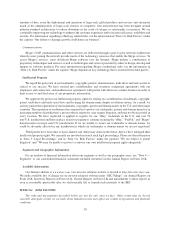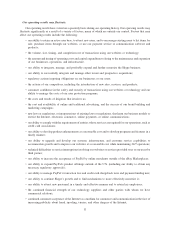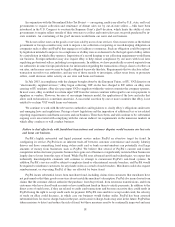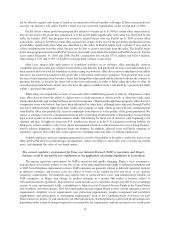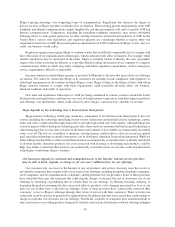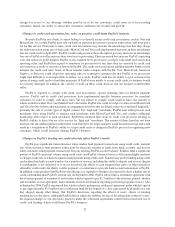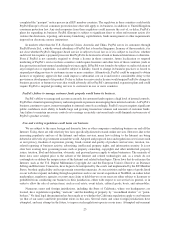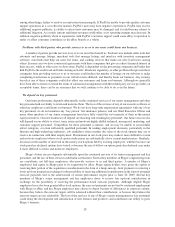eBay 2006 Annual Report Download - page 22
Download and view the complete annual report
Please find page 22 of the 2006 eBay annual report below. You can navigate through the pages in the report by either clicking on the pages listed below, or by using the keyword search tool below to find specific information within the annual report.In conjunction with the Streamlined Sales Tax Project — an ongoing, multi-year effort by U.S., state, and local
governments to require collection and remittance of distant sales tax by out-of-state sellers — bills have been
introduced in the U.S. Congress to overturn the Supreme Court’s Quill decision, which limits the ability of state
governments to require sellers outside of their own state to collect and remit sales taxes on goods purchased by in-
state residents. An overturning of the Quill decision would harm our users and our business.
We do not collect taxes on the goods or services sold by users of our services. One or more states or the federal
government or foreign countries may seek to impose a tax collection or reporting or record-keeping obligation on
companies such as eBay and PayPal that engage in or facilitate e-commerce. Such an obligation could be imposed
by legislation intended to improve tax compliance or if eBay were ever deemed to be the legal agent of eBay sellers
by a jurisdiction in which eBay operates. Imposition of a record keeping or tax collecting requirement would harm
our business. Foreign authorities may also require eBay to help ensure compliance by our users with local laws
regulating professional sellers, including tax requirements. In addition, we have periodically received requests from
tax authorities in some foreign jurisdictions for information regarding the transactions of large classes of sellers on
our sites, and in some cases we may be legally obligated to provide this data. Requirements that we disclose sellers’
transaction records to tax authorities, and any use of those records to investigate, collect taxes from, or prosecute
sellers, could decrease seller activity on our sites and harm our business.
In July 2003, in compliance with the changes brought about by the European Union, or EU, VAT directive on
“electronically supplied services,” eBay began collecting VAT on the fees charged to EU sellers on eBay sites
catering to EU residents. eBay also pays input VAT to suppliers within the various countries the company operates.
In most cases, eBay is entitled to reclaim input VAT from the various countries with regard to our own payments to
suppliers or vendors. However, because of our unique business model, the application of the laws and rules that
allow such reclamation is sometimes uncertain. A successful assertion by one or more countries that eBay is not
entitled to reclaim VAT would harm our business.
We continue to work with the relevant tax authorities and legislators to clarify eBay’s obligations under new
and emerging laws and regulations. Passage of new legislation and the imposition of additional tax or tax-related
reporting requirements could harm our users and our business. There have been, and will continue to be, substantial
ongoing costs associated with complying with the various indirect tax requirements in the numerous markets in
which eBay conducts or will conduct business.
Failure to deal effectively with fraudulent transactions and customer disputes would increase our loss rate
and harm our business.
PayPal’s highly automated and liquid payment service makes PayPal an attractive target for fraud. In
configuring its service, PayPal faces an inherent trade-off between customer convenience and security. Identity
thieves and those committing fraud using stolen credit card or bank account numbers can potentially steal large
amounts of money from businesses such as PayPal. We believe that several of PayPal’s current and former
competitors in the electronic payments business have gone out of business or significantly restricted their businesses
largely due to losses from this type of fraud. While PayPal uses advanced anti-fraud technologies, we expect that
technically knowledgeable criminals will continue to attempt to circumvent PayPal’s anti-fraud systems. In
addition, PayPal’s service could be subject to employee fraud or other internal security breaches, and PayPal would
be required to reimburse customers for any funds stolen as a result of such breaches. Merchants could also request
reimbursement, or stop using PayPal, if they are affected by buyer fraud.
PayPal incurs substantial losses from merchant fraud, including claims from customers that merchants have
not performed or that their goods or services do not match the merchant’s description. PayPal also incurs losses from
claims that the customer did not authorize the purchase, from buyer fraud, from erroneous transmissions, and from
customers who have closed bank accounts or have insufficient funds in them to satisfy payments. In addition to the
direct costs of such losses, if they are related to credit card transactions and become excessive they could result in
PayPal losing the right to accept credit cards for payment. If PayPal were unable to accept credit cards, the velocity
of trade on eBay could decrease, in which case our business would further suffer. PayPal has been assessed
substantial fines for excess charge-backs in the past, and excessive charge-backs may arise in the future. PayPal has
taken measures to detect and reduce the risk of fraud, but these measures need to be continually improved and may
18




